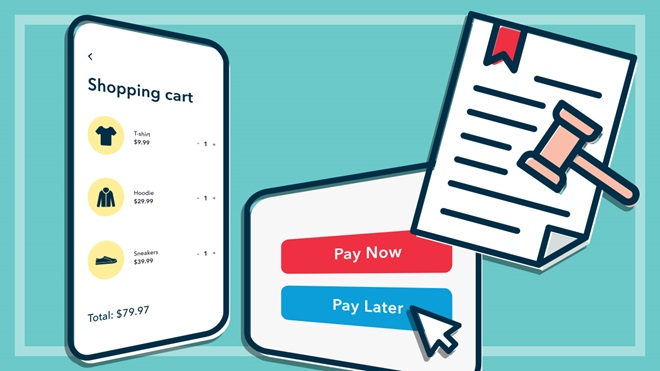The government has released draft legislation that would impose rules similar to those that apply to other credit products, but consumer groups are worried about potential gaps.
Buy now, pay later (BNPL) providers such as Afterpay, Zip and Humm have long operated in the murky world of unregulated credit, making instant loans available with few checks on whether borrowers could pay them back.
The products have been marketed as a convenient way to snatch up discretionary purchases and pay in instalments, but consumer rights groups, including CHOICE, have made the case that buy now, pay later has increasingly become a last-resort borrowing option for people experiencing financial stress.
Instead of an item of clothing or an appliance, some depend on the quick credit for essentials like food and medical care.
Instead of an item of clothing or an appliance, some depend on the quick credit for essentials like food and medical care
Now the government has released draft legislation that would regulate buy now, pay later products like any other form of credit.
BNPL providers will be required to take steps to make sure they are lending responsibly, the government says, but the requirement "will operate in a way that is flexible, adaptable and proportionate to the risk of consumer harm".
In general, this means the degree of responsible lending checks will depend on how much money is at stake.
The leeway is cause for concern, but the commitment to bringing the industry under the Credit Act and requiring buy now, pay later providers to hold a credit licence is a step in the right direction, consumer advocates say.
'Trapped in unaffordable debt'
CEO of the Consumer Action Law Centre Stephanie Tonkin says, "Every day we are speaking to people who have been harmed by these products.
"The lack of regulation means many people calling our financial counsellors take out multiple accounts in times of difficulty and become trapped in unaffordable debt spirals when repayments fall due."
The lack of regulation means many people calling our financial counsellors take out multiple accounts in times of difficulty
Consumer Action Law Centre CEO Stephanie Tonkin
While welcoming the government's intervention in the sector, Tonkin cautions that the proposed legislation is complicated and "might not result in a reduction of harm we hoped to see from regulation".
Tom Abourizk, head of policy at CHOICE, also points to the legislation's shortcomings.
"The proposed framework does not appear to require buy now, pay later providers to verify income, catering too much for fast credit approvals over accurate ones," says Tom.
'Acceptable guardrails'
While acknowledging that "some of the details may need fine-tuning", CEO of the Financial Rights Legal Centre Karen Cox says "removing this regulatory loophole and capturing buy now, pay later under the Credit Act will go a long way towards bringing these products within acceptable guardrails."
Cox adds that the proposed laws are flexible enough to capture buy now, pay later offshoots such as wage advance providers.
Removing this regulatory loophole and capturing buy now, pay later under the Credit Act will go a long way towards bringing these products within acceptable guardrails
Financial Rights Legal Centre CEO Karen Cox
Co-CEO of Financial Counselling Australia Domenique Meyrick also welcomes the draft legislation, but says "the one area we are looking at closely is what this will mean for accounts under $2000. Financial counsellors see clients with multiple, small-amount accounts and these are getting some people into debt spirals."
We're on your side
For more than 60 years, we've been making a difference for Australian consumers. In that time, we've never taken ads or sponsorship.
Instead we're funded by members who value expert reviews and independent product testing.
With no self-interest behind our advice, you don't just buy smarter, you get the answers that you need.
You know without hesitation what's safe for you and your family. And our recent sunscreens test showed just how important it is to keep business claims in check.
So you'll never be alone when something goes wrong or a business treats you unfairly.
Learn more about CHOICE membership today
Stock images: Getty, unless otherwise stated.



